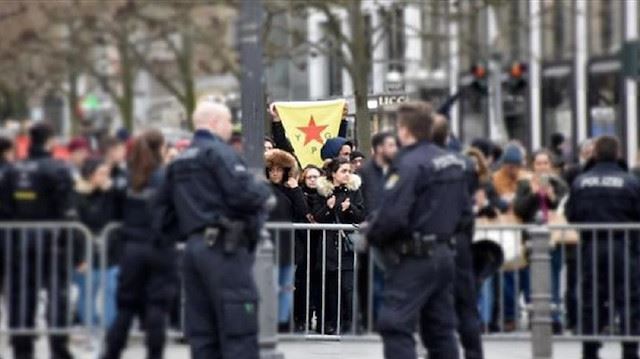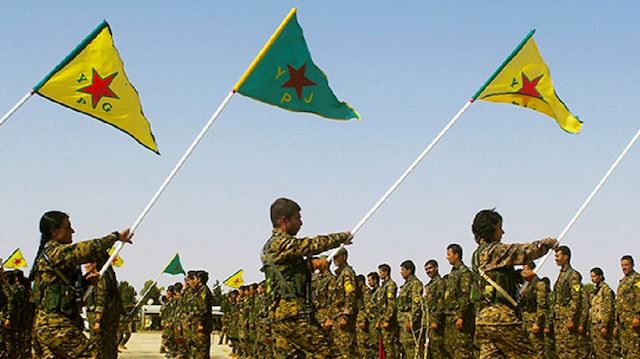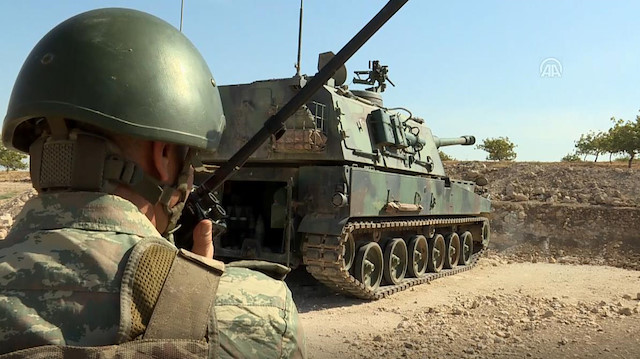Four people have been remanded in custody after trying to kidnap two children to recruit them for the PKK terror group, police said on Wednesday. The
Four people have been remanded in custody after trying to kidnap two children to recruit them for the PKK terror group, police said on Wednesday.
The four suspects were caught on Friday following a technical and physical surveillance, said a police statement, adding that they were remanded into custody after being referred to a local court.
AA
Operation Peace Spring in northern Syria
Turkish Army soldiers fire howitzers to terrorist positions in northern Syria’s Tal Abyad district as Operation Peace Spring against the PKK/YPG and Daesh terrorists continues.
A large number of digital materials and documents related to the terror group were seized at the addresses raided to arrest the suspects.
The children were delivered to their families, police said.
In its more than 30-year terror campaign against Turkey, the PKK — listed as a terrorist organization by Turkey, the U.S. and the European Union — has been responsible for deaths of 40,000 people, including women, children and infants.

PKK continues to be Europe’s favorite terror group
While the EU continues to oppose Turkey’s anti-terrorism efforts in northern Syria, the bloc’s institutions and member countries continue harboring members of the PKK, despite it being on the EU terror list.Most-wanted PKK terrorists are frequent participants in events of the European Parliament.According to the Terrorism Situation and Trend Report 2019 by EU police agency Europol, the PKK has been forcefully collecting funds from Kurdish businesses in Europe, while partaking in drug and human trafficking activities across the continent.US VP, top diplomat to visit Turkey for talksSchools suspended in north Syria amid PKK/YPG shellingIn 2015, Europol recognized the existence of PKK training camps in Belgium, as well as the foothills of the Alps in Switzerland in 2017.PKK-linked associations, foundations and media groups in France were found to easily be able to disseminate the terrorist organization’s propaganda.The report found that many groups with ties to the PKK were also present in Belgium, where it said the terrorists’ so-called Europe leaders resided.According to the German government, hundreds have left the country to join the ranks of either the PKK or YPG, with the total being 204 in 2017.US trained SDF for possible Turkish operation: reportTurkey not worried over sanctions, says ErdoğanPKK terrorists in the U.K. were found to operate as an organized criminal group, committing such crimes as drug and human trafficking.Greece and the Greek Cypriot administration are known to openly support the PKK.The PKK/PYD has an representative office in Greece and the Lavrion refugee camp southeastern Greece continues to be under PKK control.The Netherlands, Norway, Sweden, Denmark and Austria are also among the countries where the PKK is able to conduct activities with no serious repercussions.Europe’s tolerance, and at times support, towards the PKK is harshly criticized by Turkey, which accuses Europe of ignoring its security concerns.Suicide car bombing in Afghanistan kills two soldiersAnkara accuses Europe of being insincere in counter-terrorism, due to its criticism of Turkey’s fight against the PKK.Turkey on Oct. 9 launched Operation Peace Spring to secure its borders by eliminating terrorist groups there, to ensure the safe return of Syrian refugees and Syria’s territorial integrity.Ankara wants to clear northern Syria east of the Euphrates of the terrorist PKK and its Syrian offshoot, the PYD/YPG.In its more than 30-year terror campaign against Turkey, the PKK — listed as a terrorist organization by Turkey, the U.S., and the European Union — has been responsible for deaths of 40,000 people, including women, children and infants.Turkey neutralizes 637 YPG/PKK terrorists in Syria

West holds onto lies it crafted about YPG
The claim that the Kurdish People’s Protection Units (YPG) remains the most effective force in the fight against Daesh and that any intervention to harm this Syrian offshoot of the terrorist PKK would necessarily disrupt the fight against Daesh — a claim perpetually put forward by those who are opposed to Turkey’s Operation Peace Spring — is simply disinformation.The military intervention in the east of the Euphrates, whose preparations had long been underway, finally began last week, after consecutive statements from Turkish officials that an operation was impending. The start of the operation was immediately followed by a chorus of countries headed by the U.S. making statements against Ankara’s move. As we can clearly see, what underlies all these opposing statements are theses propagated in recent years in various influential international platforms in order to praise and highlight the “importance” of the YPG.When we analyze the criticisms leveled at the operation, we find that they are generally based on two particular claims. The first one is that the YPG is the most effective force in the fight against Daesh and that this fight will be hampered inasmuch as the YPG is harmed. In order to legitimize the presence of the YPG in the area, the Western public opinion, especially the U.S. media, have created the kind of narrative about the fight against Daesh that strengthens their own theses about this struggle, whereas the truth of the matter is that there were almost no other actors apart from Turkey that supported the Syrian opposition forces in the bloody battle they fought against Daesh in the last quarter of 2013 and the first half of 2014, although even the Turkish support then was limited. Syrian opposition forces cleared the countryside of Idlib and Latakia of all Daesh elements without air support. In the regions to the east of the Euphrates, however, and especially in Raqqa, Daesh defeated the opposition forces with the support of the Assad regime. Targeting opposition positions and not hitting the Daesh militants dug in nearby was a strategy of the Assad regime that was continuously witnessed for years until the fall of Aleppo. This is to explain that what the Syrian opposition was deprived of was not only air support: thanks to the Assad regime, which continuously targeted them while turning a blind eye to the Daesh militants, the latter were able to roam the land freely as if supported by an air force.The Assad regime’s plot to establish the opposition forces as their archenemy and then crushing them to open up greater swathes of territory for Daesh were vital moves for laying down the foundations of a choice to be forced upon the Western public opinion in the coming years: “me or Daesh”. And when the YPG and its sponsors began to utilize this handy, legitimizing feature of the Daesh presence, the demographic changes already underway in Syria picked up even more speed, because the YPG had a very significant “weapon” that the regime did not: the U.S. Air Force.Video: Orthodox Jews in US support Turkish Peace Spring Operation‘Legitimizing’ function of DaeshThe U.S. provided tremendous support to the YPG in the form of both weaponry and ammunition as well as military training, whereas it had previously not supported the Syrian opposition against Daesh in the Aleppo countryside. A natural outcome of this American behavior was the formation of a PKK corridor as a result of Syrian opposition forces losing territory to Daesh and this very territory ending up in YPG hands thanks to intense U.S. air support. The U.S. nourished and nurtured an organization — the Syrian offshoot of the terrorist PKK — even though this went against the sociological reality on the ground, while also peddling, through its enormous media power, the illusion that this PKK offshoot was the only force that could fight Daesh. But soon after that, Turkey launched Operation Euphrates Shield and Operation Olive Branch, both of which demonstrated the capabilities of the Syrian opposition against Daesh when provided with the necessary support while also revealing how ineffectual the YPG actually was in the absence of U.S. air support.The other thesis comprising the basis of the claims about Turkey’s military intervention is Turkey’s alleged pursuit of “demographic engineering” in the region. The theses aiming to legitimize the YPG universally “market” it as the representative of the Kurds, and in the international media this organization is often referred to as “the Kurds” in a very generalizing way. In addition, it was claimed that a military intervention into the YPG-controlled areas would result in a demographic tragedy. This, however, is contrary to the realities on the ground, too.Manbij, Tel Abyad, Raqqa, Al-Hasaka and Deir ez-Zor, which are currently under YPG control, are predominantly Arab regions. And a number of other major districts with smaller populations such as Rasulayn, Amuda, Qamishli and Ayn al-Arab have predominantly Kurdish populations. However, with the exception of Ayn al-Arab, the other districts have historically given very low levels of political support to the YPG. The YPG has been engaging in demographic engineering through brutal means to become the only force to be reckoned with in this region although it is extremely difficult for the YPG to keep this territory under control for long due to its ethnic composition and ideology. Amnesty International and Human Rights Watch reports have documented the unlawfulness of the YPG actions in the Arab territories that it seized and the demographic changes these actions have led to. Likewise, there are plenty of testimonies and visual materials proving that, in Amuda and Qamishli, two of the first regions in Syria to rise against the regime in 2011, the armed groups that intervened in the anti-regime demonstrations were also affiliated with the YPG. The oppressive policies of the YPG, which does not tolerate a single opposing voice in the Kurdish population, have led so many thousands of Syrian Kurds to leave their hometowns and made it impossible for any alternatives to the YPG to emerge in the region.The process unfolding before us shows that the weeks and months ahead will see many more manipulation attempts and black propaganda campaigns launched by the Western supporters of the YPG as to why they support the YPG and why they should punish Ankara. For this reason, we must keep our focus on the untold aspects of the fictional story that “the YPG is the only option in the fight against Daesh and the only representative of the Kurds” — a story constantly peddled to the international public opinion — and on every detail of this story purposely kept from the public.Turkey remands four trying to recruit children for PKKTurkey’s anti-terror operation rightful: Experts
